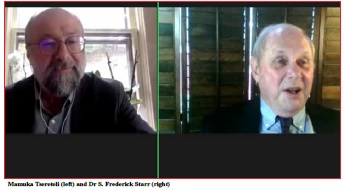Founder of Washington’s Central Asia–Caucasus Institute on Taliban Takeover in Afghanistan
By Elaine Pasquini

Washington, DC: In an August 17 interview, Dr S. Frederick Starr, founding chairman of the Central Asia–Caucasus Institute (CACI) at the American Foreign Policy Council in Washington, DC, discussed the consequences of the Taliban’s rapid takeover of Afghanistan and its impact on the future of the entire Central Asian region.
CACI senior fellow Mamuka Tsereteli interviewed Starr following his return from Uzbek President Shavkat Mirziyoyev’s conference in Tashkent on promoting economic integration and exploring ways to connect landlocked Central Asia to trade routes to the Indian Ocean.

Afghanistan in 2021 is not the country it was in 2001. Urbanization, growth of communications and an effective news media have transformed this country of 39 million people, Starr pointed out. “Life is not so simple for the new rulers of Afghanistan. They face various forms of opposition, including regional and local powers who have thoughts of their own.”
The Taliban must convince people that they are doing things that are acceptable to most Afghans, Starr said. “This makes their prospects much more complicated. It means the possibility at least of a very different Taliban than we saw earlier.”
An expert on Afghanistan, Central Asia and the Caucasus, Starr speculated on the role external powers might play in Afghanistan’s new government.
China has an economic interest in working with the Taliban government, he noted, as the Chinese have committed to building the Peshawar to Kabul rail link which eventually will transport copper from the Chinese-owned Mes Aynak mine south of Kabul.
The Chinese are also not unaware of the fact that they only need to read the US geological survey, the most detailed analysis of the mineral resources of Afghanistan, which basically concluded there is a trillion dollars worth of rare earth metals in Afghanistan, Starr explained. “The Chinese know that… and are quite active in mobilizing the Shanghai Cooperation Organization to support their approach.”
Despite Russia’s complete withdrawal of combat troops from Afghanistan in 1989, Moscow still has an interest in the country, as evidenced by a Russian cultural center built a few years ago in the center of Kabul. In addition, Russian Foreign Minister Sergey Lavrov has received Taliban officials even though the Taliban is officially banned there. “Russia is quite eager to replace the United States as an arms supplier and President Ghani was ready to buy Russian helicopters before he left office,” Starr pointed out. “Russia is very much in the game although by no means with the resources or scope of the Chinese.”
Pointing out the diversity in Pakistan, Starr stated: “There is the Pakistan of the government with elected officials, political parties and a vital press. There is also the Pakistan of the military – a sophisticated and quite closed world.”
Most importantly, he said, is the Pakistan of entrepreneurs who are dealing with modern companies and functioning globally. While at the other end of the spectrum is “the Pakistan of the countryside which includes tens of thousands of people who are directly engaged with the Pakistani version of the Taliban,” Starr said. “Whether Pakistan will be either interested in or able to control that faction remains to be seen,” Starr opined.
“This is not going to be solved tomorrow, but I think those modern sectors in Pakistan may well have reason to worry about the existence of an Islamic emirate on its western border,” he contended. “The implications of this for Pakistan are not all positive even though it seems to many that they are one of the big beneficiaries of the revolution in Kabul.”
Iran, which shares a 582-mile border with Afghanistan, has created refugee camps inside its border to temporarily house Afghans fleeing their country. Iran also shares the Dari language, one of two official languages in Afghanistan, which is sometimes referred to as “Afghan Persian.”
Sooner or later the United States, NATO and Europe are going to have to come to terms with the government that emerges in Afghanistan, Starr stressed. “For the United States to stand back and pretend it doesn’t exist is not going to be an option and we should bear in mind that if we aren’t engaged… we will have no influence on the outcome.” And, the Taliban themselves realize that one way or another they have to come to terms with Washington if they are going to survive, he added.
Starr questioned whether Washington would be “smart enough to adopt a regional approach, or…continue to have these fragmented semi-strategies throughout the region and including Afghanistan.”
“We [the US] should be modest about what we know and don’t know and we should…above all be looking forward and not back,” he concluded.
-----------------------------------------------------------------------------
Back to Pakistanlink Homepage

